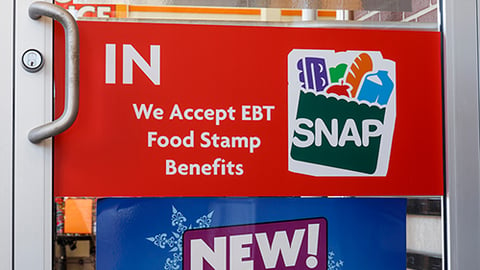Indy Grocers Cheer Legislation to Grow SNAP Online Purchasing
The National Grocers Association (NGA), the trade association representing the independent supermarket industry, has expressed its hearty approval of proposed federal legislation that would make it easier for indies to implement Supplemental Nutrition Assistance Program (SNAP) online purchasing.
Sens. Dick Durbin and Tammy Duckworth, both D-Illinois, have reintroduced the Expanding SNAP Options Act, and the House Agriculture Committee has advanced its budget reconciliation bill. According to NGA, these pieces of legislation would provide significant funding for the SNAP online purchasing program in the form of technical assistance for small and midsize grocers.
The Expanding SNAP Options Act, reintroduced Feb. 9, was originally introduced last July, along with companion legislation sponsored in the House by Rep. Robin Kelly, D-Illinois, who is expected to reintroduce a companion bill shortly. NGA has been working with Congress to find potential solutions to existing obstacles faced by indies in providing the program.
“The National Grocers Association applauds the effort by Sens. Durbin and Duckworth to expand access to the SNAP online purchasing program,” said Molly Pfaffenroth, senior director of government relations at the Arlington, Virginia-based organization. “NGA is particularly pleased with the provision that would create a technical assistance center to help more independent community grocers offer SNAP online purchasing. We look forward to working with Congress to help broaden access to nutritious food for those Americans who need it most.”
Although grocers have seen an increase in customer use of online and delivery services during the pandemic, as well as greater participation in SNAP, only a handful states and retailers had the authority last March to enable SNAP participants to use their benefits online. USDA has responded by expanding its SNAP online purchasing pilot program, allowing additional states and retailers to apply to take part.
So far, 47 states have introduced SNAP online purchasing, but independent retailers face considerable barriers in implementing the program: Establishing such a system is a long, expensive undertaking, requiring certain point-of-sale technology and website functions; further, it requires USDA approval and must undergo a testing process.
Durbin and Duckworth’s legislation would enable more independent retailers to participate in SNAP online purchasing by doing the following:
- Requiring the Secretary of Agriculture to implement online SNAP purchasing in all states.
- Providing $25 million to develop and maintain a secure, easy-to-use online and app-based portal for Electronic Benefits Transfer (EBT) redemption to support smaller retailers’ online SNAP purchasing programs.
- Providing $75 million to create a USDA Technical Assistance Center to facilitate online purchasing and use of the portal for smaller retailers, direct-to-consumer farmers and farmers’ markets, and to disseminate public information about which local vendors take part in SNAP online purchasing.
Meanwhile, the House Agriculture Committee’s fiscal year 2021 budget reconciliation bill would provide $25 million to promote technological improvements for SNAP online purchasing and other technology updates, as well as to fund further technical assistance for retailers.
“Chairman David Scott is a strong supporter of equitable access to fresh, healthy food in rural and urban areas,” observed Pfaffenroth. “We appreciate recognition by the chairman and the committee of the important role online grocery shopping plays in helping low-income families acquire the groceries they need.”
“Independent community grocers are the backbone of their communities,” noted NGA President and CEO Greg Ferrara. “As essential partners in the SNAP food delivery system, they serve millions of low-income households, including families with children, the elderly and disabled. Supermarkets have seen unprecedented demand for online services during the pandemic, and while many retailers have launched innovative solutions, such as curbside and home delivery, all independent grocers must have an opportunity to offer eligible food products and process SNAP payments online.”
Beyond Congress, the tech sector is making an effort to ease the adoption process for grocers. Last month, Charlotte, North Carolina-based e-commerce services provider Mercatus launched its SNAP EBT Online tool to enable U.S. grocers in eligible states to accept SNAP EBT and EBT cash payments as part of the Mercatus Integrated Commerce Platform’s end-to-end shopping experience.






